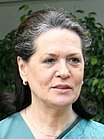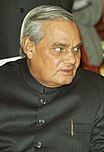Indian general elections, 2004
|
|
|||||||||||||||||||||||||||||||||||||||||||||||||||||||||||||||||||||||||||||||||||||||||||||
|
|||||||||||||||||||||||||||||||||||||||||||||||||||||||||||||||||||||||||||||||||||||||||||||
|
|||||||||||||||||||||||||||||||||||||||||||||||||||||||||||||||||||||||||||||||||||||||||||||
|
|
|||||||||||||||||||||||||||||||||||||||||||||||||||||||||||||||||||||||||||||||||||||||||||||
| Results of the National and Regional parties. | |||||||||||||||||||||||||||||||||||||||||||||||||||||||||||||||||||||||||||||||||||||||||||||
|
|||||||||||||||||||||||||||||||||||||||||||||||||||||||||||||||||||||||||||||||||||||||||||||
Legislative elections were held in India in four phases between 20 April and 10 May 2004. Over 670 million people were eligible to vote, electing 543 members of the 14th Lok Sabha. The Lok Sabha, or "House of the People," is the directly elected lower house of the Parliament of India.
On 13 May, the ruling Bharatiya Janata Party (BJP) and its alliance National Democratic Alliance conceded defeat. The Indian National Congress, which had governed India for all but five years from independence until 1996, returned to power after a record eight years out of office. It was able to put together a comfortable majority of more than 335 members out of 543 with the help of its allies. The 335 members included both the Congress-led United Progressive Alliance, the governing coalition formed after the election, as well as external support from the Bahujan Samaj Party (BSP), Samajwadi Party (SP), Kerala Congress (KC) and the Left Front. (External support is support from parties that are not part of the governing coalition).
...
Wikipedia





